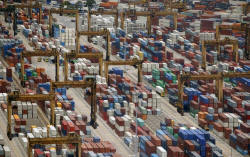|
Bid to get a China-backed
Asia trade pact in 2016 seen failing short
 Send a link to a friend
Send a link to a friend
 [June 17, 2016]
By Rebecca Howard and Charlotte Greenfield [June 17, 2016]
By Rebecca Howard and Charlotte Greenfield
WELLINGTON (Reuters) - A raft of thorny
issues including market access and trade barriers makes it very
unlikely 16 Asia-Pacific countries can hammer out a proposed
economic "partnership" by the end of this year.
The week-long 13th round of negotiations to create a Regional
Comprehensive Economic Partnership (RCEP), under way in Auckland,
New Zealand, ends on Saturday. The talks kicked off in 2013.
The original aim had been to wrap up by the end of 2015 a trade deal
that involves a total population of more than 3 billion and annual
trade volume of over $17 trillion.
But there's no sign of progress that would produce even by this
December a pact acceptable to the 10 governments in the Association
of Southeast Asian Nations (ASEAN) plus China, Japan, South Korea,
India, Australia and New Zealand.
"This is a very complex negotiation," said New Zealand chief trade
negotiator Mark Trainor, noting that the countries involved range
from some of the world's least developed to some of the richest.

"It is a difficult process to bring it in to land, given those
complexities," he said on Friday.
Stephen Jacobi, director of the New Zealand International Business
Forum, said while negotiators are working to an end-year deadline,
it is "difficult to see how they'll pull all the pieces together in
time."
NOT READY TO CLOSE
Deborah Elms, executive director of the private Singapore-based
Asian Trade Centre, said progress wasn't anywhere near enough for a
2016 deal.
"If we are just talking about some countries making adjustments to
initial offers we are not ready to close. We are not in that
ballpark," she said.
[to top of second column] |

Containers are stacked up at PSA's Tanjong Pagar container terminal
in Singapore July 24, 2015. REUTERS/Edgar Su/File Photo

In addition to trade, intellectual property provisions are also an
issue. Medecins Sans Frontieres warns that India will be negatively
impacted if some intellectual property provisions are included as
access to affordable medicine could be severely restricted.
New Zealand Trade Minister Todd McClay told Reuters there could be
an agreement by year-end but the "challenge will be the quality of
the outcome, the quality of the deal".
He said New Zealand is not "willing to forego a high quality outcome
for an issue of timing."
China and India, not in the unratified Trans-Pacific Partnership
agreement, have been keen to help create RCEP.
He Ping, a trade expert at Fudan University in Shanghai, said the
New Zealand meeting should have marked the "final sprint" toward a
deal but "right now it seems it is hard to get that sense of urgency
with RCEP."
(Additional reporting by Michael Martina; Editing by Richard Borsuk)
[© 2016 Thomson Reuters. All rights
reserved.] Copyright 2016 Reuters. All rights reserved. This material may not be published,
broadcast, rewritten or redistributed.
 |